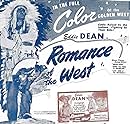Añade un argumento en tu idiomaWhen a local Indian tribe is accused of breaking a peace treaty, Indian Agent Eddie Dean gets to the bottom of things.When a local Indian tribe is accused of breaking a peace treaty, Indian Agent Eddie Dean gets to the bottom of things.When a local Indian tribe is accused of breaking a peace treaty, Indian Agent Eddie Dean gets to the bottom of things.
Imágenes
Gene Alsace
- Chico - Henchman
- (sin acreditar)
Lee Bennett
- Lawyer
- (sin acreditar)
Johnny Carpenter
- Henchman
- (sin acreditar)
Grace Christy
- White Fawn
- (sin acreditar)
Tex Cooper
- Old Timer
- (sin acreditar)
Al Ferguson
- Henchman
- (sin acreditar)
George Huggins
- Henchman
- (sin acreditar)
Argumento
¿Sabías que...?
- CuriosidadesThis film's earliest documented telecast took place in New York City on Saturday 16 April 1949 on WCBS (Channel 2). This telecast was, of course, in black and white, not in color.
Reseña destacada
I found my jaw dropping soon after this movie started, and only finished it so I could say I'd seen the whole thing and could therefore be entitled to comment on it.
It has all the problems of a lackluster school or community production (no offense to those whose productions have luster). The plentiful dialogue is awkward, running the gamut from stilted to preposterous, generally delivered with the sort of relentless exaggeration common on the stage, but which is wearisome on screen. The characters are barely one-dimensional; it seems as if the movie were modeled on an early silent (the resemblance is very strong), by someone who said, "Give me one of each!" The grizzled, gibberish-talking alcoholic sidekick, the lovable, singing, two-gun hero and his saccharine gal, the cheerful priest, the shady politician, a number of noble Native Americans in their colorful full regalia, chafing under the oppression of the capitalists, some heartrendingly cherubic children - until the roster was full. The songs are massively produced; odd even for a singing Western. Much of the time we're on an obvious sound stage, the edits are often odd (people disappear from the screen a bit before their lines are done), and the costumes - it's all sub-par, even for 1946. On the other hand, it is in color.
It has all the problems of a lackluster school or community production (no offense to those whose productions have luster). The plentiful dialogue is awkward, running the gamut from stilted to preposterous, generally delivered with the sort of relentless exaggeration common on the stage, but which is wearisome on screen. The characters are barely one-dimensional; it seems as if the movie were modeled on an early silent (the resemblance is very strong), by someone who said, "Give me one of each!" The grizzled, gibberish-talking alcoholic sidekick, the lovable, singing, two-gun hero and his saccharine gal, the cheerful priest, the shady politician, a number of noble Native Americans in their colorful full regalia, chafing under the oppression of the capitalists, some heartrendingly cherubic children - until the roster was full. The songs are massively produced; odd even for a singing Western. Much of the time we're on an obvious sound stage, the edits are often odd (people disappear from the screen a bit before their lines are done), and the costumes - it's all sub-par, even for 1946. On the other hand, it is in color.
- donjmiller
- 8 ene 2005
- Enlace permanente
Selecciones populares
Inicia sesión para calificar y añadir a tu lista para recibir recomendaciones personalizadas
Detalles
- Fecha de lanzamiento
- País de origen
- Idioma
- Títulos en diferentes países
- Romantic Adventure
- Localizaciones del rodaje
- Empresa productora
- Ver más compañías en los créditos en IMDbPro
- Duración58 minutos
- Relación de aspecto
- 1.37 : 1
Contribuir a esta página
Sugerir un cambio o añadir el contenido que falta

Principal laguna de datos
By what name was Romance of the West (1946) officially released in Canada in English?
Responde













